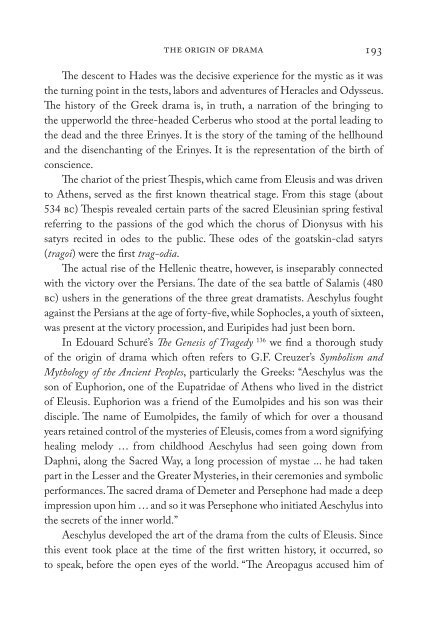The Gospel of Hellas - Research Institute for Waldorf Education
The Gospel of Hellas - Research Institute for Waldorf Education
The Gospel of Hellas - Research Institute for Waldorf Education
Create successful ePaper yourself
Turn your PDF publications into a flip-book with our unique Google optimized e-Paper software.
the origin <strong>of</strong> drama<br />
<strong>The</strong> descent to Hades was the decisive experience <strong>for</strong> the mystic as it was<br />
the turning point in the tests, labors and adventures <strong>of</strong> Heracles and Odysseus.<br />
<strong>The</strong> history <strong>of</strong> the Greek drama is, in truth, a narration <strong>of</strong> the bringing to<br />
the upperworld the three-headed Cerberus who stood at the portal leading to<br />
the dead and the three Erinyes. It is the story <strong>of</strong> the taming <strong>of</strong> the hellhound<br />
and the disenchanting <strong>of</strong> the Erinyes. It is the representation <strong>of</strong> the birth <strong>of</strong><br />
conscience.<br />
<strong>The</strong> chariot <strong>of</strong> the priest <strong>The</strong>spis, which came from Eleusis and was driven<br />
to Athens, served as the first known theatrical stage. From this stage (about<br />
534 bc) <strong>The</strong>spis revealed certain parts <strong>of</strong> the sacred Eleusinian spring festival<br />
referring to the passions <strong>of</strong> the god which the chorus <strong>of</strong> Dionysus with his<br />
satyrs recited in odes to the public. <strong>The</strong>se odes <strong>of</strong> the goatskin-clad satyrs<br />
(tragoi) were the first trag-odia.<br />
<strong>The</strong> actual rise <strong>of</strong> the Hellenic theatre, however, is inseparably connected<br />
with the victory over the Persians. <strong>The</strong> date <strong>of</strong> the sea battle <strong>of</strong> Salamis (480<br />
bc) ushers in the generations <strong>of</strong> the three great dramatists. Aeschylus fought<br />
against the Persians at the age <strong>of</strong> <strong>for</strong>ty-five, while Sophocles, a youth <strong>of</strong> sixteen,<br />
was present at the victory procession, and Euripides had just been born.<br />
In Edouard Schuré’s <strong>The</strong> Genesis <strong>of</strong> Tragedy 136 we find a thorough study<br />
<strong>of</strong> the origin <strong>of</strong> drama which <strong>of</strong>ten refers to G.F. Creuzer’s Symbolism and<br />
Mythology <strong>of</strong> the Ancient Peoples, particularly the Greeks: “Aeschylus was the<br />
son <strong>of</strong> Euphorion, one <strong>of</strong> the Eupatridae <strong>of</strong> Athens who lived in the district<br />
<strong>of</strong> Eleusis. Euphorion was a friend <strong>of</strong> the Eumolpides and his son was their<br />
disciple. <strong>The</strong> name <strong>of</strong> Eumolpides, the family <strong>of</strong> which <strong>for</strong> over a thousand<br />
years retained control <strong>of</strong> the mysteries <strong>of</strong> Eleusis, comes from a word signifying<br />
healing melody … from childhood Aeschylus had seen going down from<br />
Daphni, along the Sacred Way, a long procession <strong>of</strong> mystae ... he had taken<br />
part in the Lesser and the Greater Mysteries, in their ceremonies and symbolic<br />
per<strong>for</strong>mances. <strong>The</strong> sacred drama <strong>of</strong> Demeter and Persephone had made a deep<br />
impression upon him … and so it was Persephone who initiated Aeschylus into<br />
the secrets <strong>of</strong> the inner world.”<br />
Aeschylus developed the art <strong>of</strong> the drama from the cults <strong>of</strong> Eleusis. Since<br />
this event took place at the time <strong>of</strong> the first written history, it occurred, so<br />
to speak, be<strong>for</strong>e the open eyes <strong>of</strong> the world. “<strong>The</strong> Areopagus accused him <strong>of</strong>

















